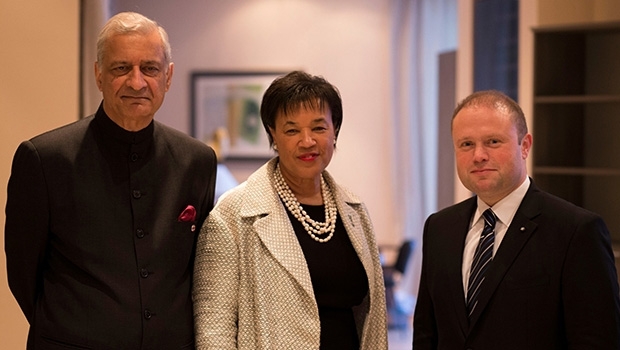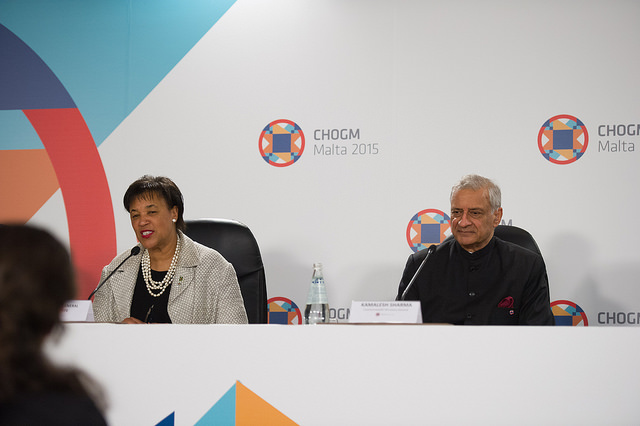by Dr Eva Namusoke, Postdoctoral Research Officer, Institute of Commonwealth Studies
After months of campaigning in the quiet corners of diplomatic offices, online on social media and in speeches from Gaborone to Valletta, the Commonwealth heads of government voted on the 27th November, and Baroness Patricia Scotland will be the next Commonwealth Secretary General. Baroness Scotland, born in Dominica and raised in the UK, will be the first woman to take on the position in a historic moment that has dominated press on her election. The election – held in a closed session – was particularly close, ran over an hour late, and required three rounds of voting before the unanimous decision in favour of Baroness Scotland was made.

L-R: Outgoing Secretary General Kamalesh Sharma, Baroness Patricia Scotland, Prime Minister of Malta Joseph Muscat.
Copyright – Shane P. Watts Photography
In the days before the 2015 CHOGM began in Malta, four summits showcased the work of increasingly vocal groups within the Commonwealth. While the Commonwealth Business Forum focused on promoting trade between member states and beyond, it was the Commonwealth People’s Forum (CPF), the Commonwealth Youth Forum (CYF), and the Commonwealth Women’s Forum (CWF) where boundaries were pushed and the potential for the 65 year old organisation was clearest. At the CPF one key theme was the promotion of LGBTI rights with the forum hosting the first LGBTI session at a Commonwealth summit. This is a particularly pressing issue for a Commonwealth where 40 of the 54 member states criminalise same-sex sexual behaviour; these 40 states make up more than half of the total number of countries globally where same-sex sexual behaviour is illegal.[1] While the Commonwealth Heads of Government Leaders’ Statement on the conclusion of the CHOGM mentioned the leaders’ commitments to addressing issues including terrorism, sustainable development, migration and climate change, the advancement of rights for LGBTI individuals was conspicuously – though perhaps unsurprisingly – absent. Soon after her election, Baroness Scotland stated that this would be one of her priorities in her first two years in leadership.
Ahead of the Secretary General election, the CPF was granted a dialogue with the 3 candidates, allowing leaders in civil society to engage with candidates for the first time in Commonwealth history. In a development that surely signalled an understanding of the calls for greater transparency in the election, the event was live-streamed. The three candidates presented their visions for the Commonwealth and were asked questions by individuals representing a range of civil society organisations across the member states. Masire-Mwamba, Sir Ronald and Baroness Scotland fielded questions on the pressing issues of the day, specifically climate change, gender equality, LGBTI rights and the rights of indigenous peoples. Masire-Mwamba emphasised the important role that can be played by civil society, Baroness Scotland referred to her work in UK government and Sir Ronald described his efforts in the Commonwealth Eminent Persons Group.
The fact that the summit included a Commonwealth Women’s Forum this year is another new development. The CWF provided an opportunity for female leaders in the Commonwealth to express their frustrations and hopes for the organisation with the keynote given by UN Women Deputy Executive Director, Lakshmi Puri, and supported by Head of Gender at the Commonwealth Secretariat, Amelia Kinahoi-Siamomua. In a document presented to the CHOGM, the CWF called for legally enforced quotas and reserved seats for women, part of a bid to increase representation, with one key declaration: “no decision should be made at any political level without women in the room.” This was a particularly pointed comment addressed at an overwhelmingly male CHOGM where only 3 of the 53 individuals eligible to vote for the next Secretary General were women. With the election of Baroness Scotland, it appears that there will – at the very highest level – be at least one woman in the room.
So what next for the incoming leader of an organisation that has been struggling to maintain its relevance in a world increasingly made up of powerful regional and international organisations? The first task for Baroness Scotland, as with previous secretary generals, will be to take stock, learn from her predecessor and possibly hire new personnel. One of Sir Sonny’s (Secretary General 1975-1990) earliest decisions was following on from his predecessor Arnold Smith’s work and sending a team – including future Secretary General Chief Emeka – to Mozambique to discuss Commonwealth assistance to the country’s move towards independence. For Chief Emeka Anyaoku (1990-2000), his term was preceded by a 6 month retreat, and one of his earliest tasks was encouraging African states to honour the 1991 Harare Declaration. In contrast, his successor Sir Don McKinnon (2000-2008) had an uncomfortable start to his term with Chief Emeka deciding to vacate his office months after the termination of his contract. Chief Emeka and Sir Don did, however, spend the week before Sir Don took office meeting every day to discuss the role of Secretary General. Eighteen months into his term, in the aftermath of September 11th, Sir Don was forced to cancel the upcoming CHOGM and react to the pressures of the international ‘War on Terror’. The impression from these three former secretary generals is that each leader approached the position with ideas about the future of the organisation, that each had to first build or build on personal relationships with Commonwealth leaders, and that their work was driven by the particular historical moment in which they lived.
One important issue for Baroness Scotland will be balancing her Dominican and British identity. As The Independent noted, Baroness Scotland is the first UK citizen to hold the post of Secretary General. While Baroness Scotland stressed her Dominican, Antiguan and African heritage and called herself ‘a child of the Commonwealth,’ her life spent in the UK, and work in the British government spanning almost 20 years will likely affect how she approaches her role as leader of the Commonwealth. The Minister of Foreign Affairs for Antigua and Barbuda, Charles Fernandez, discussed the voting process at the 2015 CHOGM with Antigua’s Observer media. Sir Ronald apparently had the lowest number of votes after the first round, leaving Baroness Scotland and Masire-Mwamba in the running. According to Fernandez, Antigua backed the Caribbean candidate in the second round: ‘We went up against Africa on one hand, and the other (voting) bloc of the Europeans. As you know, Baroness Scotland is a member of the English Parliament. They openly lobbied very heavily for her.’ Furthermore, according to Fernandez, Baroness Scotland had the support of the Pacific nations and Australia and this, combined with Malta and Cyprus’ support, secured her victory. The most salient point of Fernandez’ statement is the reference to Baroness Scotland’s position in the British Parliament. Prime Minister David Cameron had not publically shown support for her, and Baroness Scotland herself had emphasised her Caribbean roots in her campaign; however the contention of the Antiguan minister is that it was ultimately her European, specifically British, political connections that led to her election.
Baroness Scotland’s election doesn’t mean a return to the “British Commonwealth” as one particularly incensed Caribbean media source reported, but her ties to Great Britain may come into question if she takes a stand on the issues where there is strong disagreement between member states, none more so than LGBTI rights. Baroness Scotland is clearly aware of these difficulties, and stated in her first press conference: “Human rights and development go hand in hand. We will walk with and work with our partners to help everyone appreciate human dignity.” Whatever her first move as Secretary General, her stance on polemic issues or her legacy as a leader, Baroness Scotland is keen to recognise the important moment of her election; her final words immediately after her election: “I am incredibly proud to be the first woman Secretary General.”
This article is also available at the Commonwealth Opinion blog.
[1] Corinne Lennox and Matthew Waites ,‘Human rights, sexual orientation and gender identity in the Commonwealth: from history and law to developing activism and transnational dialogues’ in Human Rights, Sexual Orientation and Gender Identity in The Commonwealth: Struggles for Decriminalisation and Change, Corinne Lennox and Matthew Waites (eds.), (London, 2013) p. 1-6. http://commonwealth.sas.ac.uk/publications/house-publications/lgbt-rights-commonwealth


I very much appreciate a lot of the interviews conducted by Madam Sue Onslow as they remind me of my time in the Nigeria High Commission in London as the Commonwealth desk officer 1980-1984 and also in Nigeria 1984 to 1987. I was privileged to attend CHOGM in India, 1983; Nassau, 1985; and Vancouver, 1987. Those were the interesting era of the Commonwealth.
The interviews gave comprehensive perspectives of main actors that made the Commonwealth a great organization to look forward to.
It is very vital that the Secretary General has to be a strong and firm personality with the courage of his conviction to move the Organization forward.
The ABC with New Zealand should not be allowed to constitut another Security Council with veto power as the Commonwealth is a “FAMILY.”
The ABC, India, Malaysia, South Africa and Nigeria should belt up and fund the Organization adequately, while the new SecGen should seek for people with experience and expertice on contemporary issues contained in the Sustainable Development Goals of the UN, particularly, the eradication of poverty and combatting the negative impacts of the environment/climate change among its 54 member states.
Best wishes and my sincere appreciation to Madam Sue Onslow for her invaluable work.
Amb Jaiyeola J Lewu